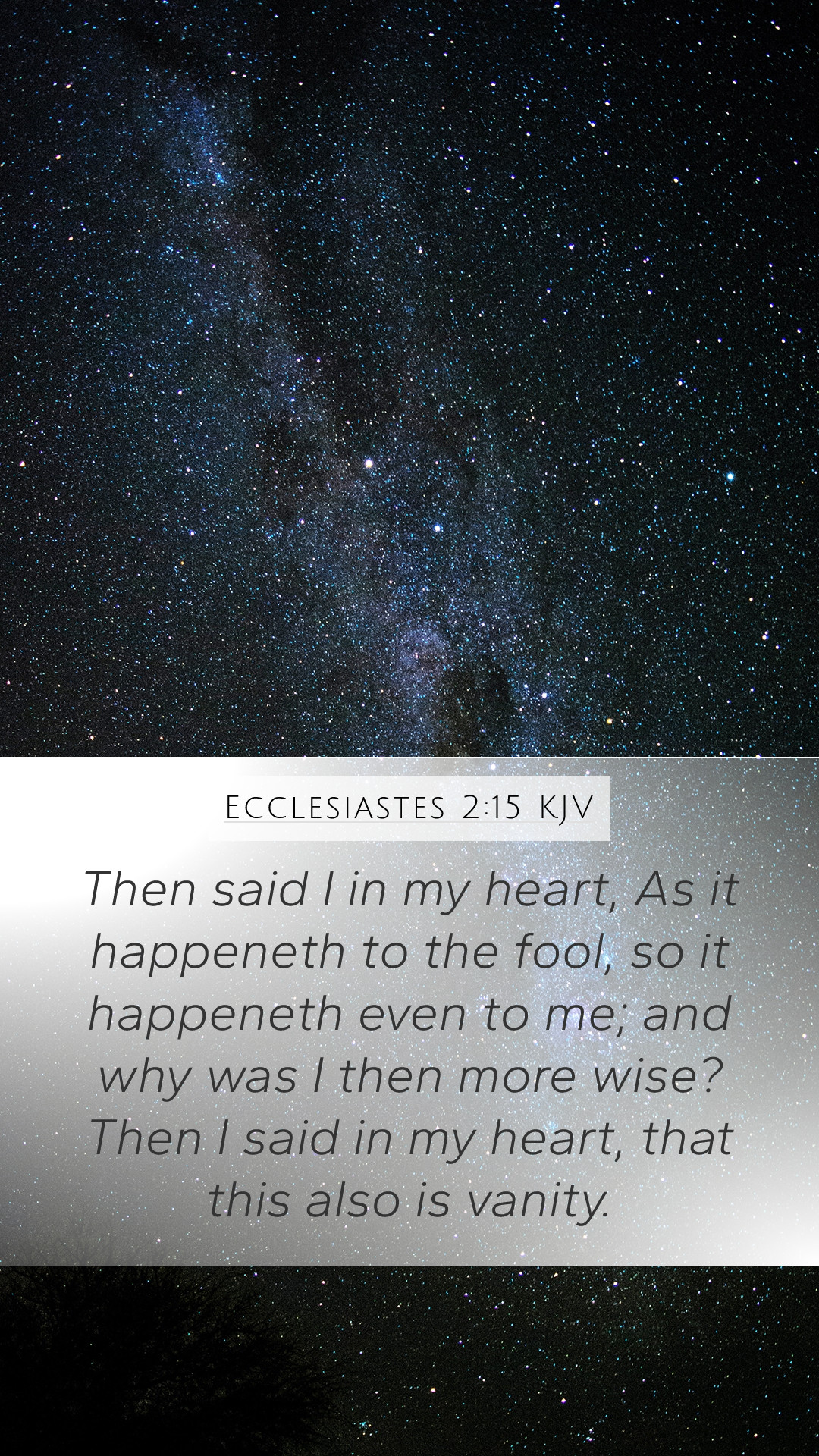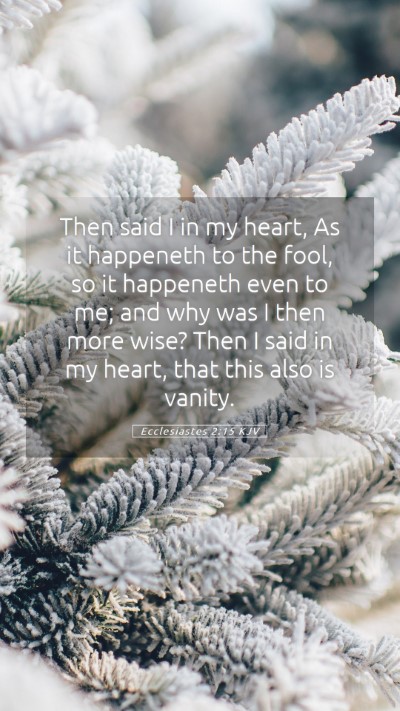Understanding Ecclesiastes 2:15: A Comprehensive Bible Verse Commentary
Ecclesiastes 2:15 states, "Then said I in my heart, As it happeneth to the fool, so it happeneth even to me; and why was I then more wise? Then said I in my heart, that this also is vanity." This verse presents a profound meditation on the nature of wisdom and folly, reflecting the author’s struggle to find meaning in life under the sun. Below is an analysis of its significance, drawing from notable public domain commentaries.
Verse Context and Background
The book of Ecclesiastes is often attributed to King Solomon, who explores themes of meaning, wisdom, and the fleeting nature of life. This particular verse falls within a larger discourse where the teacher (often thought of as Solomon) grapples with the apparent futility of human endeavors and wisdom.
Summary of Insights from Public Domain Commentaries
- Matthew Henry: Henry emphasizes that wisdom does not guarantee a better outcome in life compared to folly. He notes that both the wise and the foolish meet the same fate in death, which presents a stark reminder of life’s vanity. The pursuit of wisdom is not inherently fulfilling unless it is aligned with God’s will.
- Albert Barnes: Barnes highlights the existential crisis within this verse. He suggests that the realization that all are subject to the same fate leads to despair unless one recognizes the value of a life lived in pursuit of God. The fool, despite his lack of wisdom, ultimately experiences the same end—a sobering thought that prompts deeper reflection on the purpose of life.
- Adam Clarke: Clarke focuses on the philosophical implications of the verse. He interprets the teacher’s lament as an acknowledgment that earthly wisdom may not provide a significant advantage and concludes with the idea that the true gain lies in a relationship with the divine rather than in intellectual pursuits alone.
Analysis of Key Themes
This verse illustrates several key themes related to human experience, wisdom, and the quest for meaning:
- The Nature of Wisdom: Wisdom is commendable, but it can lead to disillusionment if one expects it to safeguard against the inevitable.
- Equality in Death: The reminder that both the wise and the foolish share the same end serves as a humbling reflection on life’s temporality.
- Vanity of Life: The repeated acknowledgment of "vanity" emphasizes the fleeting, often paradoxical nature of our pursuits.
Application of the Verse
Understanding Ecclesiastes 2:15 invites readers to reflect on their own lives, especially regarding how they value wisdom relative to other pursuits. Here are several considerations for application:
- Rethink Priorities: Individuals should evaluate what they consider beneficial in life, particularly the relationship between wisdom and happiness.
- Seek Lasting Fulfillment: This verse encourages seeking fulfillment beyond intellectual accomplishments, advising one to pursue a spiritually grounded life.
- Accept Human Limitations: Acknowledging the limitations of human understanding helps cultivate humility and reliance on God.
Cross References
For a deeper theological understanding, consider these related verses:
- Proverbs 21:30: "There is no wisdom, nor understanding, nor counsel against the Lord."
- Ecclesiastes 3:19: "For what happeneth to the sons of men happeneth to beasts; even one thing happeneth to them: as the one dieth, so dieth the other; yea, they have all one breath; so that a man hath no preeminence above a beast."
- Job 12:2: "No doubt but ye are the people, and wisdom shall die with you."
Conclusion
Ecclesiastes 2:15 serves as a profound reminder of the complexities of life. By recognizing the limitations of human wisdom and the inevitability of death, the verse calls for a deeper exploration of what constitutes a meaningful life. Substantial insights emerge from public domain commentaries, providing a nuanced understanding that can enrich Bible study groups and personal reflections. Engaging with this scripture leads to critical questions about our values and purpose, pushing us to align our lives with greater significance.
This commentary enriches the understanding of Scripture, providing valuable Bible study insights concerning the Book of Ecclesiastes and human experience. Whether in online Bible study or traditional groups, this analysis acts as a guide for anyone seeking a deeper understanding of biblical teachings.


